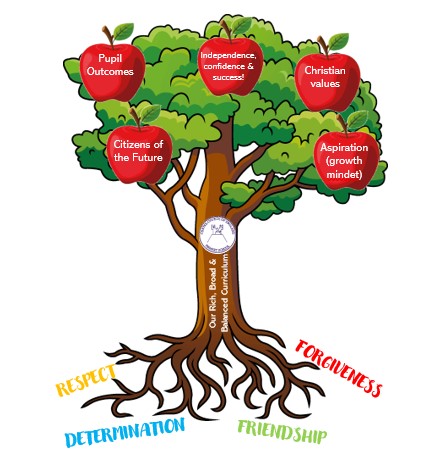
This page provides details about what DT looks like at Crayke Primary. It includes our Intent Statement, our coverage and progression document and our “jigsaw” explaining how teaching and learning in DT links to our four core values of Friendship, Forgiveness, Respect and Determination.
The DT Subject Leaders are: Mrs Helfferich and Miss Walker
Design and Technology NC Programme of Study

Ensuring access to a rich, broad and balanced curriculum, based upon and framed by our school values of Respect, Determination, Friendship and Forgiveness, is at the heart of Crayke’s provision…
Rationale:
The fundamental aim of Crayke Church of England Primary School is to provide opportunities for children to develop as independent, confident, successful learners with high aspirations; creating citizens of the future who know how to make a positive contribution to their community and the wider society. This aligns with our school vision which strives to enable children to “Follow your pathway and grow together with confidence.”

Design & Technology intent:
Being a Crayke Designer means that pupils learn:
- Significant levels of originality and the willingness to take creative risks to produce innovative ideas and prototypes.
- An excellent attitude to learning and independent working.
- The ability to use time efficiently and work constructively and productively with others.
- The ability to carry out thorough research, show initiative and ask questions to develop an exceptionally detailed knowledge of users’ needs.
- The ability to act as responsible designers and makers, working ethically, using finite materials carefully and working safely.
- A thorough knowledge of which tools, equipment and materials to use to make their products.
- The ability to apply mathematical knowledge.
- The ability to manage risks exceptionally well to manufacture products safely and hygienically.
- A passion for the subject and knowledge of, up-to-date technological innovations in materials, products and systems.

Meeting National Curriculum requirements, we deliver a rich, broad and balanced curriculum. Crayke engages all learning styles using a variety of resources which support the teaching of the curriculum. The wider learning culture is promoted through our school values of ‘Determination, Respect, Friendship and Forgiveness’ and through a culture of our aspirational ‘Crayke Growth Mindset’.
EYFS:
The EYFS Curriculum for Expressive Arts and Design: Art and Design is taught in a variety of ways through adult-led and adult-supported tasks and child initiated learning in well resourced provision areas, both indoors and outdoors. Children are encouraged to represent their own thought, feelings and ideas through art and design.
KS1 & KS2:
Using the National Curriculum and Kapow (see attached), we follow a rolling 2 year programme (Year A and Year B) This ensures that all key topics are covered and supports the progression of skills across our mixed age classes.
Our curriculum is built through a thematic approach which makes connections in skills and knowledge.
Where appropriate, we block learning in order to immerse children fully. Where relevant and possible, we offer enrichment activities to motivate, excite and inspire pupils in the form of ‘Stunning Starts’, ‘Marvellous Middles’ and ‘Fabulous Finishes’ – these may take the form of educational visits, visitors, theme days, achievement assemblies, exhibitions etc..
We follow our lesson structure (see attached) making connections and spotting values through our DT lessons.
Creatively produced DT books give children a sense of pride in the presentation of their work.
Design & Technology impact:
Impact will be measured by assessing against the Kapow statements through ‘Insight pupil tracking’ as:
- Below
- Just below
- On track
Crayke designers will be able to demonstrate the essential characteristics of designers as detailed in the Intent section above.
They will successfully be able to:
- Master practical skills
- Design, make, evaluate and improve
- Take inspiration from design throughout history
They will use the school Christian values of Respect, Determination, Friendship and Forgiveness to drive their DT attainment and show progress against the Kapow knowledge and skills statements alongside demonstrating aspiration, confidence, independence as they develop in to citizens of the future.







